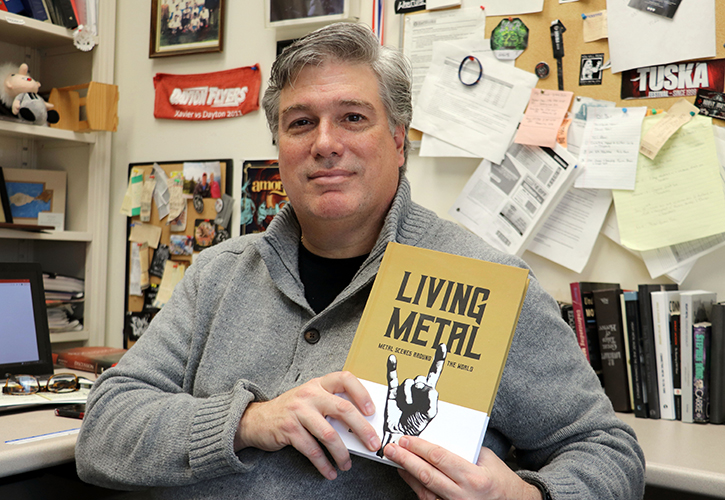College of Arts and Sciences Newsroom

UD English professor publishes book on heavy metal music scenes across the globe
By Carolyn Kroupa ’22
University of Dayton English professor Bryan Bardine contributes to the field of metal music studies with the publication of his latest book, Living Metal: Metal Scenes Around the World. Believed to be the first study of its kind, the book examines international metal scenes from smaller communities like Dayton to entire countries, such as Brazil and England.
Bardine edited the book with Mount St. Joseph University professor Jerome Stueart. The 13 chapters highlight heavy metal music scenes across six continents. The chapters are deeply embedded in local histories and contexts and provide important analyses of their respective scenes.
“The goals of the book are to increase the conversations about metal scenes to other metal scholars and to bring this research to fans,” Bardine said. “The book is written in a way that is accessible to professional metal scholars plus anyone interested in music."
Bardine, who received his bachelor’s and master’s degrees from the University, wrote the chapter about the Dayton scene with Jacob Hale. Dayton was ranked No. 14 among the 100 biggest metal scenes in the U.S., according to a 2016 Vice.com analysis.
After conducting more than 30 interviews, Bardine found common themes related to family, comradery and support. For example, when a Dayton-area couple lost their baby, members of the local scene came together to pay for the funeral. The Dayton scene also has united to raise money and donate clothes and food to the homeless.
Metal scenes vary across the world because bands incorporate sentiments into their lyrics that represent the local scene. Music is often used as an outlet to let out aggression and express how people feel about themselves, government, religion and other topics.
“Music is honest, and lyrics say things people don’t want to say in polite society,” Bardine said.
Bardine explained that “metalheads,” as fans are commonly called, are ostracized by society at times depending on where they come from. Fans wear black t-shirts and long hair and are made fun of for being different. This is a uniting experience that bonds people.
“Music is the glue,” Bardine said.
The book’s authors explore music scenes in countries such as post-apartheid South Africa, Austria, Denmark, Germany, Estonia, Australia and New Zealand. The foreword was written by Henkka Seppälä, former bassist with the Finnish metal band Children Of Bodom.
“The idea for this book came to me in 2017, and it took about four years until it was published,” Bardine said.
Language was a barrier to editing, as some chapters were written by scholars from France and Japan, among other countries.
Bardine has worked on several books as a writer, editor and concept originator. He serves as chair of The International Society for Metal Music Studies. The organization hosts global conferences, including several at UD in 2014 and 2016.
Bardine teaches a course called Metal as Cultural Experience, which requires students to attend a metal show.
“Students don’t know what to expect, but they get a lot out of it while also having a lot of fun,” Bardine said. “Students examine the culture, how the band and crowd interact, the fashion and the venue itself, and there is a writing assignment along with it.”
Andrew Slade, professor and Department of English chair, recognizes the value of Bardine’s research.
“It was Bryan’s experience of being a metal fan and getting to know other fans that are also academics that he became one of the leading organizers of scholarly conversation around metal music,” Slade said. “An important aspect of his work is that he’s always looking to bring new voices in from places around the world.
“At UD, research is constantly influencing teaching. Having faculty active in research brings things into the classroom that can’t otherwise come in,” Slade said.
The field of metal studies involves historians, economists, English scholars and more. The first significant research was published in 1990, and the field has been rapidly growing since with more books and research published yearly.
“Anytime I do metal research, my hope is it goes beyond people that are in the know,” Bardine said. “There are more metal bands today than there ever were because of the internet. Metal music is alive and well.”
For more information, visit the Department of English website.
